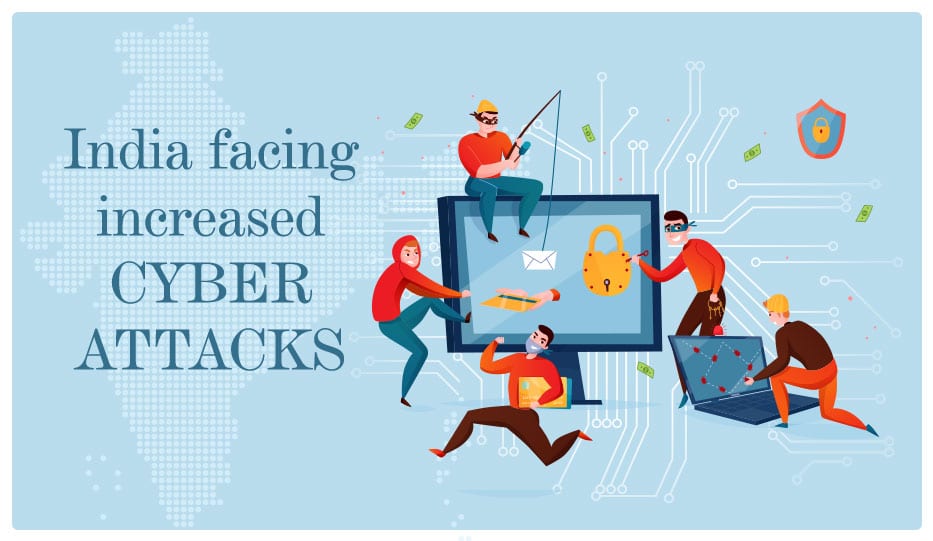In News:Express View on ‘digital arrest’ fraud: Prompt action needed; I lost money in a digital arrest fraud — this is what I’ve learnt from my experience
1.What are the major cyber threats confronting India today, and how do these challenges impact national security and individual privacy? Analyse the government’s initiatives to combat these cyber threats and suggest measures to enhance public awareness and cybersecurity measures.
As India navigates its digital transformation, the country faces significant cyber threats that have escalated in recent years. Between January 1 and April 30, 2024, the National Cybercrime Reporting Portal recorded 7.4 lakh complaints, highlighting the alarming rise in cybercriminal activities.
Major cyber threats confronting India today:
- Critical Infrastructure vulnerability: Key sectors like power and transportation are at risk, exemplified by the attempted cyber-attack on Kudankulam Nuclear Power Plant in 2019.
- Financial sector threats: Cybercriminals target banks, as seen in the malware attack on City Union Bank’s SWIFT system in March 2020, resulting in unauthorised transactions.
- Data breaches and privacy concerns: Increased digitalization raises the risk of data breaches, highlighted by the leak during the Common Admission Test (CAT) in 2021.
- Cyber espionage: India faces threats from state-sponsored cyber espionage, such as the “SideCopy” operation in 2020 aimed at stealing confidential information.
- Advanced Persistent Threats (APTs): These sophisticated attacks target sensitive systems, with a notable example being China-linked APTs targeting India’s power sector.
- Ransomware attacks: The healthcare sector is particularly vulnerable, illustrated by the ransomware attack on AIIMS Delhi in November 2022.
- According to the Indian Cybercrime Coordination Centre (I4C), there are several types of rackets including:
● Digital arrest scam: Fraudsters impersonate law enforcement officials to extort money.
● Trading scam: Victims are lured into fraudulent trading schemes.
● Investment scam: Task-based scams promising high returns on investments.
● Romance/dating scam: Scammers exploit online dating platforms to defraud individuals.
Impact on National Security and Individual Privacy
- Compromised national security: Cyberattacks on critical infrastructure can disrupt essential services, impact economic growth, and undermine national security.
- Erosion of public trust: Data breaches can erode public trust in government institutions and private organisations.
- Financial loss: Cybercrimes can lead to significant financial losses for individuals and businesses. As per IAC, Between January-April this year, Indians lost Rs 120.3 crore in digital fraud, Rs 1,420.48 crore in trading scams, Rs 222.58 crore in investment scams and Rs 13.23 crore in romance/dating scams.
- Social and political instability: Cyberattacks can be used to spread misinformation and destabilise society.
Government initiatives:
- National Cyber Security Policy: Outlines strategies for protecting cyberspace and enhancing capabilities against cyber attacks.
- Indian Cyber Crime Coordination Centre (I4C): Provides a coordinated framework for law enforcement to tackle cyber crimes effectively.
- Computer Emergency Response Team (CERT-In): Protects critical information infrastructure and enhances resilience across sectors.
- Cyber Swachhta Kendra: A portal to scan and clean computer systems.
- Digital India Initiative: Aimed at promoting digital literacy and cybersecurity awareness.
To further strengthen India’s cybersecurity posture, the following measures can be implemented:
- Public awareness campaigns: Increase awareness about cybersecurity threats to empower citizens to recognize scams.
- Investment in cybersecurity infrastructure: Strengthen technical capabilities and establish cybersecurity centres of excellence.
- Training programs: Develop skilled workforce through training focused on emerging technologies like AI and cloud security.
- Legal framework updates: Enact comprehensive laws addressing cybercrime, including cyber terrorism and fraud.
- Collaboration with the private sector: Foster partnerships between government and private organisations for better information sharing and response strategies.
- International cooperation: Collaborating with other countries to share information and combat cyber threats.Ex:During India’s G20 Presidency, the grouping recognized cyber security as a critical component of the digital economy and has also been part of the Quad cybersecurity partnership
By addressing these significant challenges through robust initiatives and public engagement, India can enhance its cybersecurity landscape and protect its national interests effectively.
PYQ
- Cyber warfare is considered by some defense analysts to be a larger threat than even Al Qaeda or terrorism. What do you understand by Cyber warfare? Outline the cyber threats which India is vulnerable to and bring out the state of the country’s preparedness to deal with the same.2013
- Discuss the potential threats of Cyber attack and the security framework to prevent it.2017
- Discuss different types of cyber crimes and measures required to be taken to fight the menace.2020
- What are the different elements of cyber security? Keeping in view the challenges in cyber security, examine the extent to which India has successfully developed a comprehensive National Cyber Security Strategy. 2022
Source:
https://indianexpress.com/article/opinion/editorials/express-view-on-digital-arrest-fraud-prompt-action-needed-9643406/; https://indianexpress.com/article/opinion/columns/i-lost-money-digital-arrest-fraud-learnt-my-experience-9646414/

